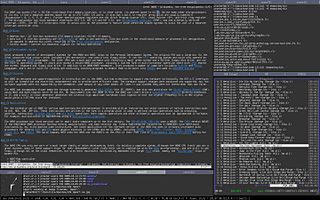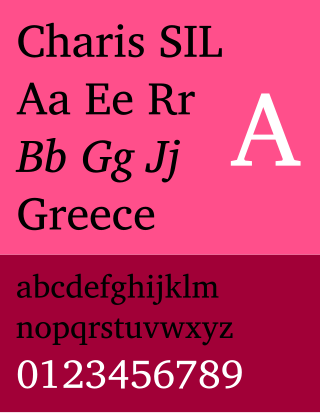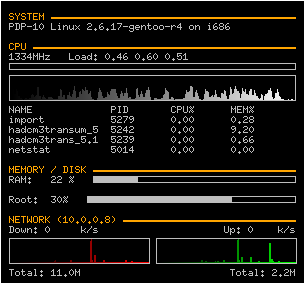
The X Window System is a windowing system for bitmap displays, common on Unix-like operating systems.

XFree86 is an implementation of the X Window System. It was originally written for Unix-like operating systems on IBM PC compatibles and was available for many other operating systems and platforms. It is free and open source software under the XFree86 License version 1.1. It was developed by the XFree86 Project, Inc. The lead developer was David Dawes. The last released version was 4.8.0, released December 2008. The last XFree86 CVS commit was made on May 18, 2009; the project was confirmed dormant in December 2011.
freedesktop.org (fd.o), formerly X Desktop Group (XDG), is a project to work on interoperability and shared base technology for free-software desktop environments for the X Window System (X11) and Wayland on Linux and other Unix-like operating systems. Although freedesktop.org produces specifications for interoperability, it is not a formal standards body.

In Unix computing, Ion is a tiling and tabbing window manager for the X Window System. It is designed such that it is possible to manage windows using only a keyboard, without needing a mouse. It is the successor of PWM and is written by the same author, Tuomo Valkonen. Since the first release of Ion in the summer 2000, similar alternative window management ideas have begun to show in other new window managers: Larswm, ratpoison, StumpWM, wmii, xmonad and dwm.
X.Org Server is the free and open-source implementation of the X Window System (X11) display server stewarded by the X.Org Foundation.

Courier is a monospaced slab serif typeface commissioned by IBM and designed by Howard "Bud" Kettler (1919–1999) in the mid-1950s. The Courier name and typeface concept are in the public domain. Courier has been adapted for use as a computer font, and versions of it are installed on most desktop computers.

FreeType is a software development library used to render text onto bitmaps, and which provides support for other font-related operations. The FreeType font rasterization engine is free and open-source software with the source code dual-licensed under a BSD-like license and the GPL. FreeType supports a number of font formats, including TrueType, Type 1, and OpenType.
Keith Packard is a software developer, best known for his work on the X Window System.
These tables provide a comparison of operating systems, of computer devices, as listing general and technical information for a number of widely used and currently available PC or handheld operating systems. The article "Usage share of operating systems" provides a broader, and more general, comparison of operating systems that includes servers, mainframes and supercomputers.

Luxi is a family of typefaces originally designed for the X Window System by Kris Holmes and Charles Bigelow from Bigelow & Holmes Inc. The Luxi typefaces are similar to Lucida – their previous font design.

Cairo is an open-source graphics library that provides a vector graphics-based, device-independent API for software developers. It provides primitives for two-dimensional drawing across a number of different backends. Cairo uses hardware acceleration when available.

There are Unicode typefaces which are open-source and designed to contain glyphs of all Unicode characters, or at least a broad selection of Unicode scripts. There are also numerous projects aimed at providing only a certain script, such as the Arabeyes Arabic font. The advantage of targeting only some scripts with a font was that certain Unicode characters should be rendered differently depending on which language they are used in, and that a font that only includes the characters a certain user needs will be much smaller in file size compared to one with many glyphs. Unicode fonts in modern formats such as OpenType can in theory cover multiple languages by including multiple glyphs per character, though very few actually cover more than one language's forms of the unified Han characters.
Core fonts for the Web was a project started by Microsoft in 1996 to create a standard pack of fonts for the World Wide Web. It included the proprietary fonts Andalé Mono, Arial, Arial Black, Comic Sans MS, Courier New, Georgia, Impact, Times New Roman, Trebuchet MS, Verdana and Webdings, all of them in TrueType font format packaged in executable files (".exe") for Microsoft Windows and in BinHexed Stuff-It archives (".sit.hqx") for Macintosh. These packages were published as freeware under a proprietary license imposing some restrictions on distribution.
Fontconfig is a free software program library designed to provide configuration, enumeration and substitution of fonts to other programs. Fontconfig was originally written and maintained by Keith Packard, and is currently maintained by Behdad Esfahbod.

The X Rendering Extension is an extension to the X11 core protocol to implement image compositing in the X server, to allow an efficient display of transparent images.

XCB is a library implementing the client-side of the X11 display server protocol. XCB is written in the C programming language and distributed under the MIT License. The project was started in 2001 by Bart Massey and aims to replace Xlib.

Charis SIL is a slab serif typeface developed by SIL International based on Bitstream Charter, one of the first fonts designed for laser printers. The font offers four family members: roman, bold, italic, and bold italic.
Resolution independence is where elements on a computer screen are rendered at sizes independent from the pixel grid, resulting in a graphical user interface that is displayed at a consistent physical size, regardless of the resolution of the screen.

dwm is a minimalist dynamic window manager for the X Window System developed by Suckless that has influenced the development of several other X window managers, including xmonad and awesome. It is externally similar to wmii, but internally much simpler. dwm is written purely in C for performance and lacks any configuration interface besides editing the source code. One of the project's guidelines is that the source code is intended never to exceed 2000 SLOC, and options meant to be user-configurable are all contained in a single header file.

Conky is a free software desktop system monitor for the X Window System. It is available for Linux, FreeBSD, and OpenBSD. Conky is highly configurable and is able to monitor many system variables including the status of the CPU, memory, swap space, disk storage, temperatures, processes, network interfaces, battery power, system messages, e-mail inboxes, Arch Linux updates, many popular music players, weather updates, breaking news, and much more. Unlike system monitors that use high-level widget toolkits to render their information, Conky is drawn directly in an X window. This allows it to be configured such that it consumes relatively few system resources.












